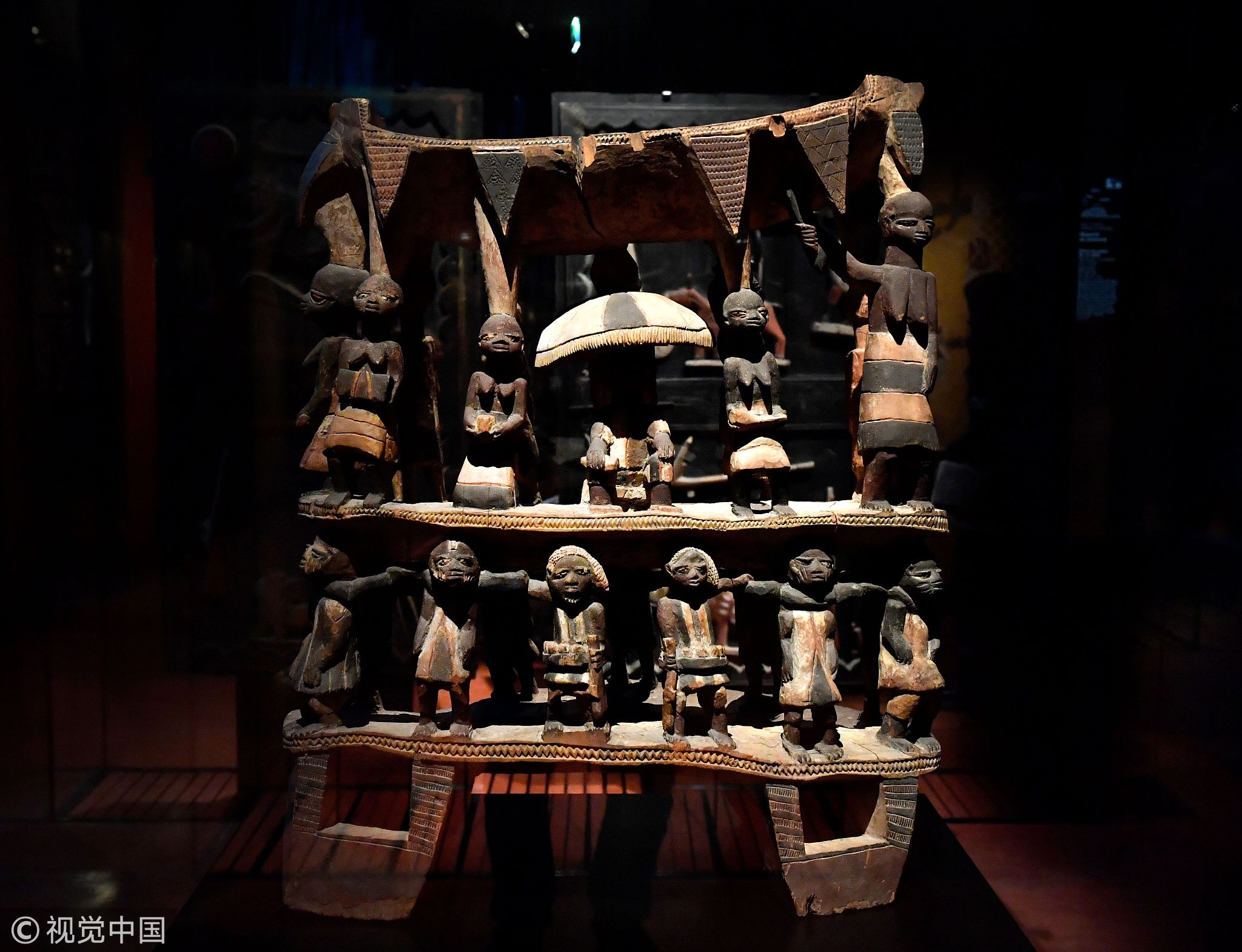
Arts
16:35, 25-Nov-2018
France to return 26 artworks to Benin
Updated
15:55, 28-Nov-2018
CGTN

France's President Emmanuel Macron agreed Friday to return 26 artworks to Benin "without delay," his office said.
The decision came as Macron received the findings of a study he had commissioned on returning African treasures held by French museums, a radical policy shift that could put pressure on other former colonial powers.
He proposed gathering African and European partners in Paris next year to define a framework for an "exchange policy" for African artworks.
Macron agreed to return 26 royal statues from the Palaces of Abomey - formerly the capital of the Kingdom of Dahomey - that were taken by the French army in 1892 and are now housed at Paris' Quai Branly museum.

Big royal statues of the Kingdom of Dahomey dating back to 1890-1892 are pictured at the Quai Branly Museum-Jacques Chirac in Paris, June 18, 2018. /VCG Photo
Big royal statues of the Kingdom of Dahomey dating back to 1890-1892 are pictured at the Quai Branly Museum-Jacques Chirac in Paris, June 18, 2018. /VCG Photo
Benin had requested their restitution, and earlier this week was pleased that France had followed the process through to the end.
But Macron's office said this should not be an isolated or symbolic case.
The president "hopes that all possible circulation of these works are considered: returns but also exhibitions, loans, further cooperation", the Elysee Palace said.
The report he received on Friday proposed legislation be developed to return thousands of African artworks taken during the country's colonial period, now in French museums, to nations that request them.

Royal Seat of the Kingdom of Dahomey from the early 19th century is pictured at the Quai Branly Museum-Jacques Chirac in Paris, June 18, 2018. /VCG Photo
Royal Seat of the Kingdom of Dahomey from the early 19th century is pictured at the Quai Branly Museum-Jacques Chirac in Paris, June 18, 2018. /VCG Photo
There are conditions, however, including a request from the relevant country, precise information about the works' origins, and the existence of proper facilities such as museums to house the works back in their home country.
Macron also wants "museums to play an essential role in this process", his office said.
They will be invited to "identify African partners and organize possible returns".
Museums should quickly establish "an online inventory of their African collections" to allow for searching an item's provenance, the statement said.

A door of the palace of King Glegle of the Kingdom of Dahomey dating back to 1880-1889 is pictured at the Quai Branly Museum-Jacques Chirac in Paris, June 18, 2018. /VCG Photo
A door of the palace of King Glegle of the Kingdom of Dahomey dating back to 1880-1889 is pictured at the Quai Branly Museum-Jacques Chirac in Paris, June 18, 2018. /VCG Photo
Macron also called for "in-depth work with other European states that retain collections of the same nature acquired in comparable circumstances".
Calls have been growing in Africa for restitution of artworks, but French law strictly forbids the government from ceding state property, even in well-documented cases of pillaging.
Macron raised hopes in a speech last year in Burkina Faso, saying "Africa's heritage cannot just be in European private collections and museums."
He later asked French art historian Benedicte Savoy and Senegalese writer Felwine Sarr to study the matter.
Their report has been welcomed by advocates of the restitution of works which were bought, bartered, or in some cases simply stolen.
(Top Photo: French President Emmanuel Macron gives a speech during his visit at the University of Louvain in Louvain-la-Neuve, Belgium, November 20, 2018. /VCG Photo)
Source(s): AFP

SITEMAP
Copyright © 2018 CGTN. Beijing ICP prepared NO.16065310-3
Copyright © 2018 CGTN. Beijing ICP prepared NO.16065310-3